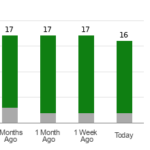
Colorado’s Historic Journey
A decade ago, Colorado embarked on a historic journey, becoming the first U.S. state to legalize and regulate recreational marijuana sales on January 1, 2014, setting the stage for a transformative evolution in the cannabis industry. This groundbreaking decision not only reshaped the state’s cannabis landscape but also left an indelible mark on the national and global discourse on legalization.
See Also: Legal Cannabis In Colorado Turns Ten: Still Lots To Learn But Sky Hasn’t Fallen, Positive Results Abound
Shaping Regulations
Key figures, notably Governor Jared Polis (D) and state lawmakers played instrumental roles in crafting and refining Colorado’s regulatory framework. Gov. Polis reflected on this journey. “Since Colorado voters legalized cannabis a decade ago, Colorado has developed one of the leading regulatory systems in the world,” inspiring similar frameworks across the nation and globally, reported Marijuana Moment.
Youth Access Mitigated, Public Health Prioritized: The Colorado Department of Revenue’s Marijuana Enforcement Division (MED) reported an impressive 99 percent compliance rate for ID verification at cannabis businesses, highlighting the success of regulatory measures in addressing youth access concerns while prioritizing public health.
National and Global Influence: Inspiring Leadership
Colorado’s influence transcends borders, inspiring 24 U.S. states and numerous countries to adopt cannabis regulations inspired by the state’s leadership. Brian Vicente, a key proponent of Colorado’s 2012 legalization initiative, emphasized the state’s impact on drug policy, citing recent initiatives to decriminalize and regulate psilocybin and other natural medicines.
Recognition From Former Opponents
Even former opponents of the 2012 ballot initiative, such as U.S. Sen. John Hickenlooper (D-CO) and former Denver Mayor Michael Hancock (D) publicly acknowledged the success of the regulatory model, with Hickenlooper advocating for federal reform to build on the progress made at the state level.
Economic Impact
Coined as an ‘experiment’ by Brian Vicente, Colorado’s approach to cannabis proved successful. Over the past decade, legal marijuana sales surpassed $15 billion, generating approximately $2.6 billion in cannabis tax and fee revenue. These funds strategically supported public education, substance use treatment, law enforcement training, affordable housing, research and efforts to combat the illicit market.
Fiscal Milestone
Colorado’s nonpartisan Legislative Council Staff (LCS) disclosed a significant fiscal achievement, revealing that the state generated more tax revenue from cannabis than alcohol or cigarettes in the last fiscal year. This economic achievement not only contributed to the flourishing cannabis industry but also stimulated job creation, providing a boost to the overall state economy.
See Also: How Colorado’s Marijuana Tax Money Benefits Many Business Sectors Beyond Cannabis
Looking Ahead
- As Colorado celebrates a decade of legal recreational marijuana sales, Gov. Polis remains a driving force, advocating for further reforms and proposing new tax distributions.
- Supporting the Secure and Fair Enforcement Regulation (SAFER) Banking Act, he emphasized the need for federal legalization. In a recent letter, Polis, among the governors of Illinois, New York, New Jersey, Maryland and Louisiana, collectively urged President Biden to reschedule cannabis to Schedule III of the Controlled Substances Act, aligning it with a safe, regulated product that Americans can trust.
Investors, Seize the Opportunity: Notably, Medicine Man Technologies Inc., operating as Schwazze SHWZ, emerged as the only multi-state operator (MSO) with substantial exposure in Colorado.
Read Next: Biden Considers Marijuana Rescheduling: Boon Or Bust For The Industry? Former Top FDA Official Weighs In
Image by Fr. Daniel Ciucci On Unsplash





